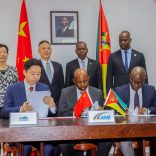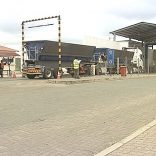Mozambique allocates land to Zambia to develop dry port at Nacala
Mozambican government continues to look for solutions for former textile factory Textáfrica

A view of a part of Texttáfrica's facilities. The President of the Republic, quoted by Mozambican daily newspaper Notícias, even admitted the possibility of changing the factory’s activity in order to make them useful. [File photo: DW]
he Mozambican government is looking for solutions to monetize the facilities of Textáfrica – Sociedade Têxtil de Vila Pery, President Filipe Nyusi said on Tuesday in Manica, according to the Mozambican press.
The President of the Republic, quoted by Mozambican daily newspaper Notícias, even admitted the possibility of changing the factory’s activity, in order to make the facilities useful.
The factory located in the city of Chimoio (formerly Vila Pery), capital of Manica province, has been at a standstill for over 25 years and has been the focus of a number of announcements of intent by provincial and national officials over the years.
In February 2019, Manica Provincial Governor Manuel Rodrigues stated that South African textile-related companies, which he did not identify, had expressed an interest in reactivating the factory and had even visited the textile facility, once one of the largest factories in the sector in Africa.
In February 2018, the Prime Minister of Mozambique, Carlos Agostinho do Rosário, said that he had visited the company’s premises to meet with the provincial government, managers and other stakeholders in the process, “to understand the situation and to take the appropriate measures to revive the sleeping monster and make it work and create employment.”
In April 2016, then-provincial governor of Manica Alberto Mondlane announced that the central government was conducting studies to restore Textáfrica to operation.
The stoppage of two textile factories, Textáfrica and the Empresa Moçambicana de Malhas (EMMA), both originally owned by the same Portuguese group, caused the cotton crop to be reduced in that part of Mozambique, and their bankruptcy resulted in the dismissal of more than 3,000 workers.
When Textáfrica stopped operating, all its assets were handed over to the Millenium bim bank as a guarantee on a loan of US$1.1 million, mainly used to compensate workers and also to evict many of them from the homes built around the manufacturing facilities.













Leave a Reply
Be the First to Comment!
You must be logged in to post a comment.
You must be logged in to post a comment.